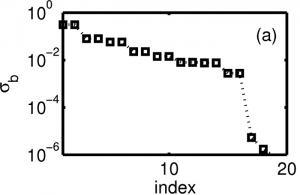Thermoacoustic instabilities in a ducted premixed flame: reduced order models & control,
Agharkar, P., Subramanian, P., Kaisare, N. S. & Sujith, R. I.

Abstract:
The problem of combustion instabilities arising from the thermoacoustic interactions in a ducted premixed flame model is considered. Contrary to the conventionally used low-order models to describe such systems, a high dimensional model governed by a set of the acoustic equations coupled to the equations for flame dynamics is employed. The flame front is discretized into finite flame elements to assign internal degrees of freedom to the front and track its evolution. Model reduction schemes, namely proper orthogonal decomposition (POD) and balanced truncation, are used to reduce the size of this model. Compared to POD modes, balanced modes show superior input–output characteristics, in agreement with the full model. POD modes on the other hand capture the transient growth in the model while the balanced modes do not. Performance of POD modes is highly dependent on the snapshots used for their computation. A linear quadratic Gaussian (LQG) framework using the reduced-order model based on 16 balanced modes is formulated to control thermoacoustic instabilities in the linear model. The controllers thus obtained are then used on the nonlinear model. They successfully curtail limit cycle oscillations in the nonlinear plant and also avoid subcritical transition to instability.
Publication details: Combustion Science & Technology, vol. 185(6), pg. 920-942, 2013.
